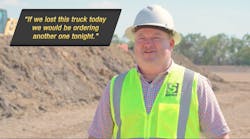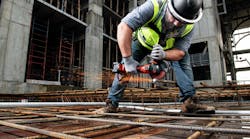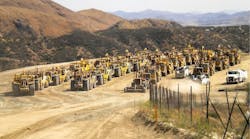A broad coalition of business and civic leaders and elected officials have unveiled a transportation funding plan aimed at jump starting Colorado’s economy, creating and retaining thousands of jobs, and investing in long-delayed bridge and road safety projects.
The Colorado FASTER (Funding Advancement for Surface Transportation & Economic Recovery) plan is designed to provide a predictable, responsible and sustainable source of funding for hundreds of transportation projects that have been delayed due to a lack of funds – resulting in the significant loss of construction jobs in every corner of Colorado.
At a state Capitol news conference, Gov. Bill Ritter said the common-sense plan weds the urgent need to spark economic growth and create jobs with Colorado’s expanding list of roads and bridges in need of safety repairs and maintenance upgrades. "This legislation will help our economy recover quicker, create vital jobs and allow us to build a modern, safe and efficient transportation system," Gov. Ritter said. "Colorado effectively spends as much on transportation today as we did 25 years ago, and our current funding formula simply is not sustainable. If we’re going to build a 21st century transportation system to get our economy moving again, we can’t do it using a 20th century financial model."
Initial Target: 125 Bridges
Colorado FASTER is expected to invest $250 million annually in transportation projects. The initial $100 million will be put to work on projects to upgrade the 125 poor deficient bridges identified by the Colorado Department of Transportation. The remaining $150 million will be invested each year in roadway safety and divided among the state, counties and municipalities.
"Economic growth requires a reliable and functioning transportation system," said Joe Blake, president and CEO of the Denver Metro Chamber of Commerce. "Colorado FASTER is a first step towards beginning the work of rebuilding our aging roadways and bridges and putting Coloradans back to work."
"Building and properly maintaining Colorado’s transportation system is a shared responsibility of state and local governments. There are more than 115,000 miles of county roads in Colorado. These roads are a fundamental piece of our economic viability. They carry farm and other natural resource products to market, allow for fire and police protection in all corners of the state and provide the road home for hundreds of thousands of Coloradans" said Commissioner David Foy, CCI’s President-elect.
Colorado FASTER is being sponsored in the legislature by Sen. Dan Gibbs and Rep. Joe Rice and is backed by a broad statewide coalition, including the Denver Metro Chamber of Commerce, business leaders, contractors and county and municipal elected officials. "Because of the current economic climate, we have been working very hard with a coalition of legislators and businesses to come up with responsible legislation that will create jobs at both the state and local level," Sen. Gibbs said. "This legislation is the best way to create tens of thousands of jobs across the state by investing in transportation and we hope it will be passed."
"We must take strong action to put Colorado’s economy back into the fast lane, and focusing on the hundreds of transportation projects that urgently need attention is the right route for the 21st century," said Rep. Rice. "We’ll create family-sustaining jobs and tackle a serious, and growing, transportation challenge."
The Colorado Contractors Association estimates that Colorado FASTER holds enormous promise for expanding jobs throughout the state, since, on average, contractors have been forced to lay off 30 percent of their workforce and have millions of dollars of equipment sitting idle. CCA studies indicate that an annual investment of $250 million or more would create 10,000 jobs directly, and a potential for 30,000 additional jobs.
"At no time in recent memory has the need for economic stimulus through state investment in infrastructure been so important," said Tony Milo, executive director of the Colorado Contractors Association. "This investment is vital on many levels, not the least of which is economic development. If we are to succeed in the future, we must have our roads and bridges repaired and rebuilt, and new ones constructed. Coloradans needs the jobs. And, Colorado needs an infrastructure to meet the needs of the 21st Century." The time is right to tackle the growing list of roads and bridges in need of repair. CDOT figures show the state has 115 bridges that are 75 years old, highway sections that are 75 to 100 years old and interstate sections that are up to 50 years old. There are 125 poor deficient bridges. Forty percent of Colorado’s roads are in poor condition and one in five needs to be completely reconstructed.
Revenue Source
The Colorado FASTER plan would harness revenue from Road and Bridge Safety Surcharges paid at the same time each vehicle’s registration is renewed, with higher fees charged to heavier vehicles, and increased permit fees for oversize and overweight vehicles. Finally, the plan would boost penalties for late registration or failure to register a vehicle. The average Colorado motorist could expect to spend approximately an additional $3.50 per month for road and bridge safety.
Colorado FASTER also places a strong focus on 21st century transportation solutions, including the creation of a High Performance Transportation Enterprise that will seek to expand the use of public-private partnerships, design-build contracting and other proven innovations. The plan will also launch a pilot program to allow Colorado communities to evaluate the feasibility of mileage-based revenue systems as a potential replacement for the gasoline tax.



